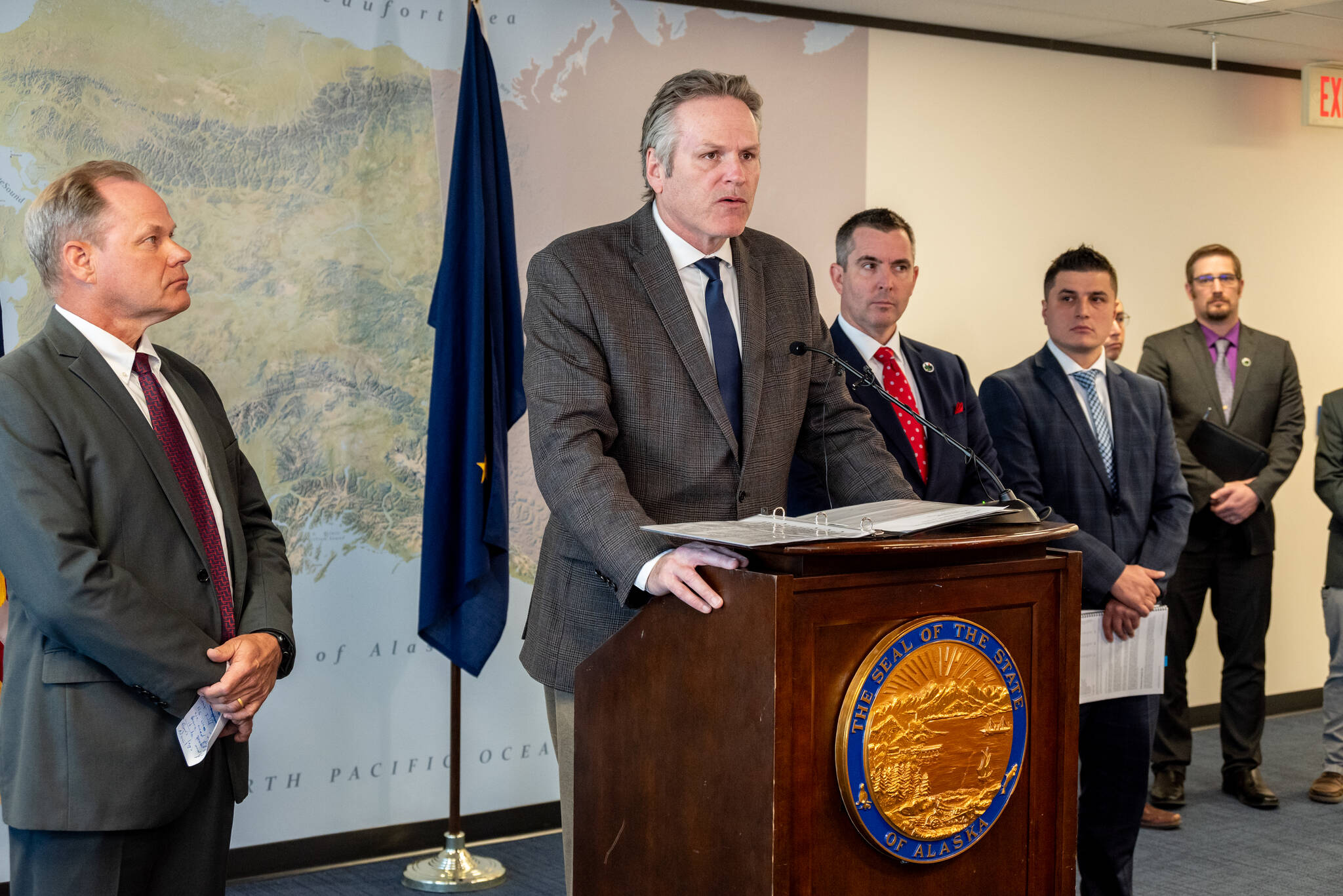In response to a pending shortage of natural gas resources in Cook Inlet, Gov. Mike Dunleavy last week announced that he will introduce legislation lowering the state’s royalty rate for oil and gas companies operating in the area.
Speaking from the Atwood Building in Anchorage on Oct. 26, Dunleavy said the proposal would reduce Alaska’s roughly 12.5% royalty rate on Cook Inlet gas production. The Alaska Department of Natural Resources in their 2022 Cook Inlet Gas Forecast found that demand for Cook Inlet gas could outpace supply as early as 2027 without additional development in the basin’s active fields.
“The belief is that we could start putting gas into the system at that point, which would extend our timeline hopefully for several years if not beyond, which gives us time, again, to implement some of the other initiatives that we’re going to talk about later on this fall in preparation for the session,” Dunleavy said.
If the Alaska Legislature approves the bill next session and it is signed into law, Dunleavy said it’s expected that resulting new development would come online within the next two to three years.
Alaska Department of Natural Resources Commissioner John Boyle, who also spoke at Thursday’s press conference, said the looming shortage is an economic, rather than geologic, problem.
“Of course what’s technically recoverable and what’s economically recoverable is really at issue here,” Boyle said. “The heart of what DNR took a look at is what levers do we have within our control, within our power to help incentivize (and) to make economic these existing gas resources that we know are there.”
The 2022 DNR Cook Inlet Gas Forecast estimated that there are 820 billion cubic feet of proved gas reserves that are economic to develop. The current demand for Cook Inlet gas is about 70 billion cubic feet per year. A separate study conducted by the U.S. Geological Survey in 2011 estimated that there could be as much as 19 trillion cubic feet of undiscovered natural gas in the basin.
“We firmly believe that by creating a more competitive economic environment in the Cook Inlet that we will see economic activity increase, we will see more exploration, we’ll see more development and, ultimately, we’ll see more production which will trickle out to greater energy security for the Railbelt and for Alaska at large,” Boyle said.
Boyle said lowering royalty rates for producers would build on other state efforts to incentivize development in the region. The state announced this month that, as part of its annual Cook Inlet lease sale this year, it would offer royalty-free lease terms.
“Instead of coming in and paying the state a flat royalty rate as they start producing new oil, companies will only pay the state based upon their ability to be profitable or not,” Boyle said. “Again, this is one way that the state can help de-risk and improve the economics of projects that might be marginal.”
Alaska Department of Revenue Deputy Commissioner Fadil Limani said lowering the floor of royalty rates wouldn’t cost the state money because it is already not profiting from the lack of new development.
“Simply put, the current 12.5% of zero is actually zero,” Limani said. “So, in essence, 1% of something is better than 100% of nothing. If a qualified, new production does come online as a result of the proposed legislation, then that would essentially have a positive revenue impact.”
During the most recent state and federal oil and gas lease sales in Cook Inlet, Hilcorp Alaska LLC was the only company to bid on parcels — on about 23,000 acres during the state sale and on roughly 5,700 acres during the federal sale. Cook Inlet was also left entirely out of the federal government’s five-year leasing program published last month.
Both Dunleavy and Boyle during Thursday’s press conference attributed a lack of industry interest in the most recent state and federal lease sales to what they said was the federal government’s ideological opposition to resource development in Alaska.
Boyle called the federal government “squarely responsible” for creating an environment in which companies do not want to bid and is “intimidating industry.”
“The federal government is creating a climate of uncertainty in terms of companies not knowing that if they actually bid on leases, whether they’ll be given a fair shake in the permitting process or whether federal agencies will interminably drag out the process to keep them from being able to actually acquire the permits they need,” Boyle said.
Dunleavy agreed, saying that Alaska has been “singled out and brutalized” by President Joe Biden’s administration. Both Dunleavy and Boyle pointed to the federal government’s cancellation of leases issued in 2021 in the Arctic National Wildlife Refuge as contributing to industry reluctance to pursue permits in Cook Inlet.
“What we’re seeing is a forced conversion to another type of approach to energy that is not being market driven,” Dunleavy said. “When you sell uncertainty across the board, it shouldn’t surprise anyone that investors are hesitant to invest, especially in a place like Alaska.”
Shortly after Thursday’s press conference, members of the Alaska House Majority announced via press release that they are committed to “finding effective solutions” to the pending shortage.
“If Alaskans are to prevent or lessen the duration of a dramatic increase in our household gas and electric bills in the next 12-24 months, more natural gas must be produced locally,” Rep. Ben Carpenter, R-Nikiski, is quoted as saying in the release. “Paying for imported liquid natural gas at a premium is not a reasonable solution when we have abundant reservoirs in our backyard.”
Bidding in the state’s upcoming oil and gas lease sales opens on Nov. 20, with bid results released on Dec. 13. Any legislation introduced by Dunleavy is subject to approval by the Alaska Legislature.
Dunleavy’s full Thursday press conference can be streamed on the governor’s YouTube channel.
Reach reporter Ashlyn O’Hara at ashlyn.ohara@peninsulaclarion.com.


